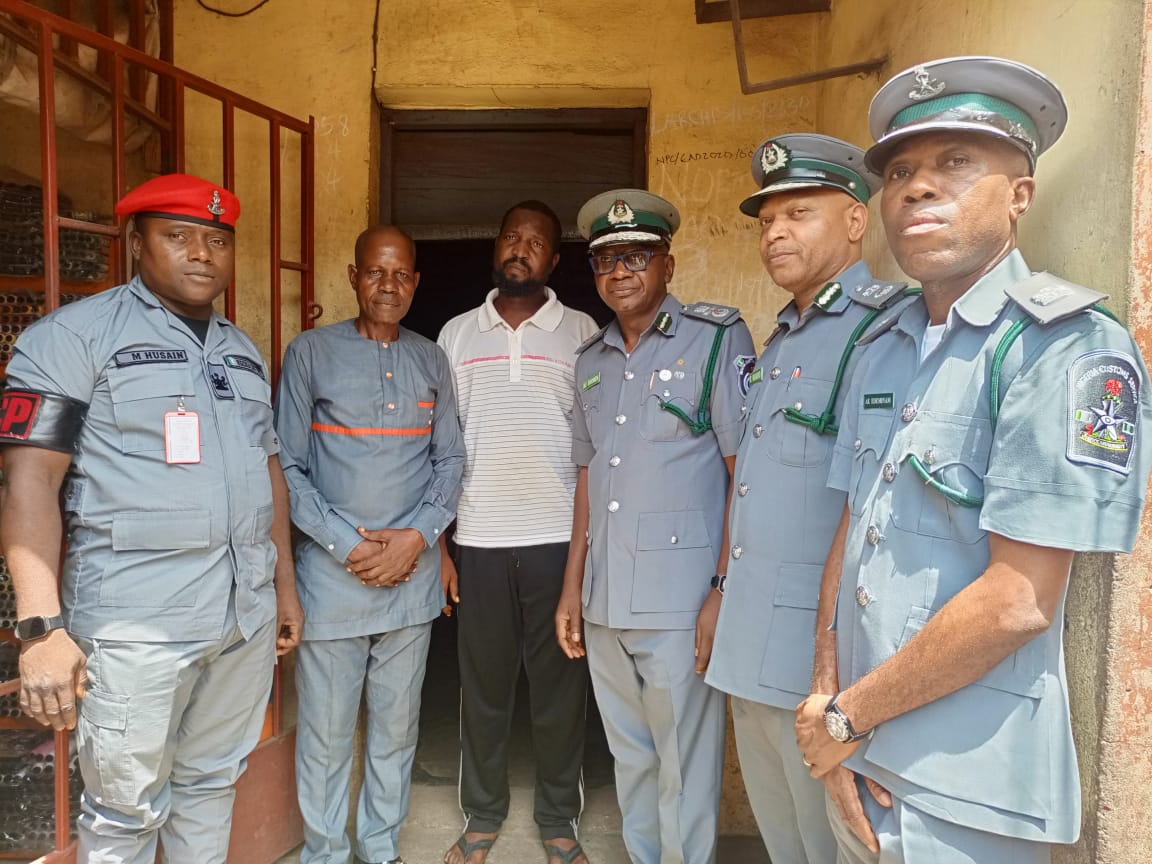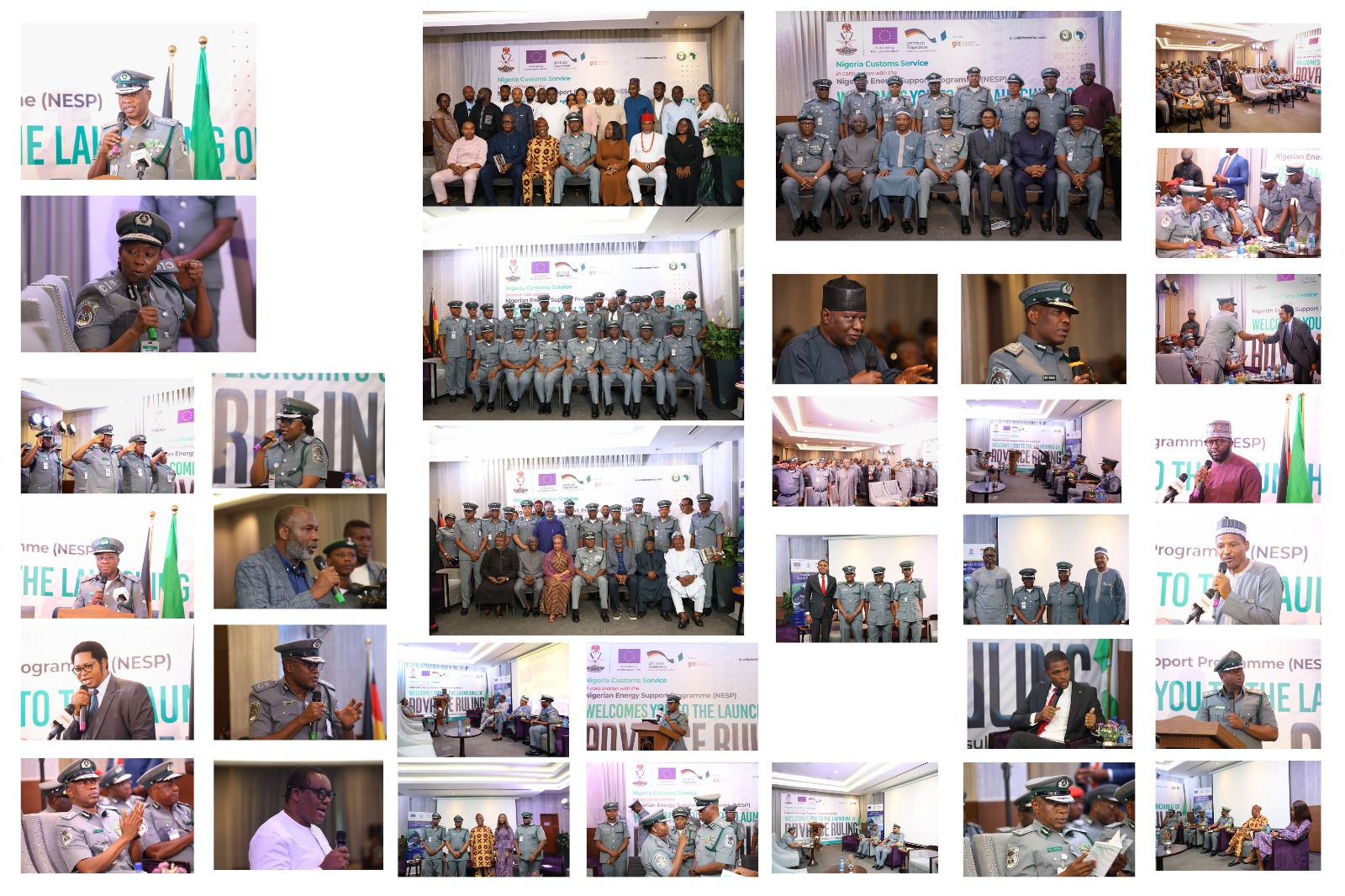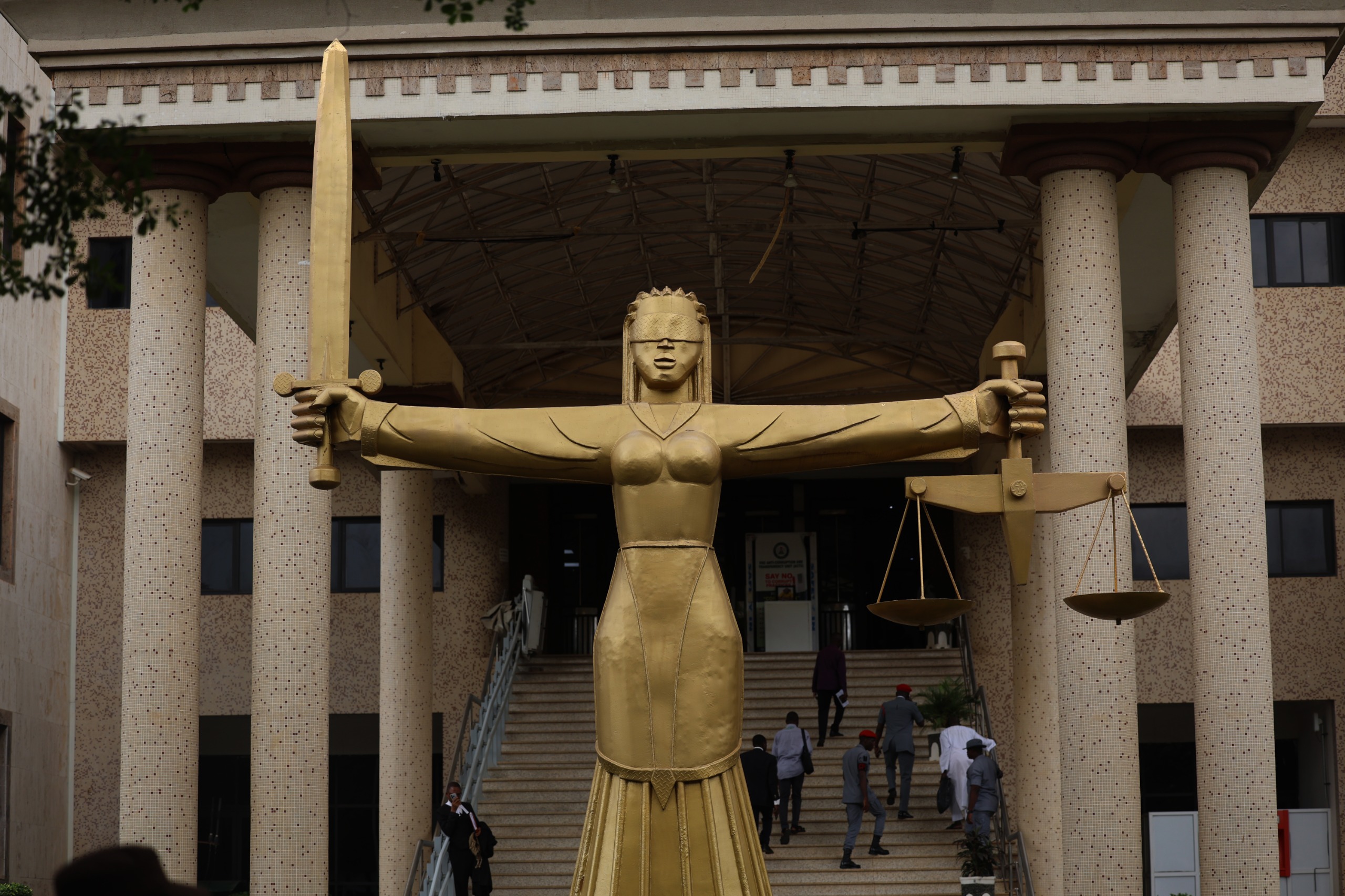Customs Corner
Nigeria’s Porous Border Makes Case for Customs Modernization Project

Author: Gift Wada.
With a total land border of 4,045 Km, and 853 Km of the maritime domain, statistics show that there are about 1,500 identified land border crossings into Nigeria, but only 84 (covering 4,000 sq km) have approved control posts.
The porosity of Nigeria’s land border has resulted in the prevalence of drug and human trafficking as well as smuggling.


In 2022, Nigeria’s Chief of Defense Staff, Maj. Gen. LE Iraboh said the vulnerability of the vast unmanned land areas has continued to be a key source of criminality and violent crimes in parts of the country.
Considering the global nature of border fragility which is not peculiar to Nigeria, the World Customs Organization (WCO), in collaboration with the Nigeria Customs Service organized in Abuja Nigeria, a Global Conference entitled “Enabling Customs in Fragile and Conflict-Affected Situations”.
Fragile borders are areas where state agencies, particularly Customs, are unable to operate properly owing to the insecurity created by non-state armed groups. Insecurity and disruption of the State’s administration affect the border economy and the livelihood of border communities.
The event, which took place from 31 January to 2 February 2023, brought together more than 100 representatives of Customs administrations from over 40 countries to discuss the role of their administrations in fragile and conflict-affected situations (FCS) and how the WCO can support its Members in shaping their strategies in response to these complex environments. They were joined by representatives from various United Nations agencies and the donor community.
The Conference highlighted the similarities that exist across several regions concerning fragile borders: the role of borders as symbolic and economic resources for communities, the embeddedness of smuggling in social activities, the connection between smuggling and mining activities, and the informal taxation levied by non-state armed groups, such as terrorists, criminal gangs or guerrillas, on traders and cross-border flows of commodities.
In his opening speech, WCO Secretary General Kunio Mikuriya reminded participants of the objective of this event, namely to transform the outcomes of the WCO field research initiated in 2016 in more than 14 countries into a practical action plan for all Members impacted by fragility and conflict. “We aim at refining our analysis and at fuelling an Action Plan on Fragile Borders that should guide the activities of the WCO over the coming years in this area”, he said.
Nigeria’s Vice President, Prof. Yemi Osinbajo pointed out that “fragile borders not only aggravate conflicts, they rob the states of crucial income that could address some of the social issues that contribute to conflict. It is obvious from the sheer number of fragile borders, and the convergence of fiscal and security issues at such borders, that governments must actively redefine the role of Customs to be properly integrated into the security architecture.”
Comptroller General of the Nigeria Customs Service, Col. Hameed Ibrahim Ali (Rtd) welcomed delegates and explained that “fragile situations call for an analysis of the role of Customs in national security policies, the capacity and tools available to Customs as well as strategies in enabling Customs and the coordination between agencies of government in effectively managing fragile and conflict situations at borders”.
The Conference has provided an opportunity to cross-fertilize the policy debates on fragile borders from Customs, anti-terrorism, humanitarian and economic perspectives, and to extend both geographically and conceptually the notion of fragile borders that has been explored so far by the WCO.

 Similarly, Nigeria Customs while presenting paperwork titled “Fragile Borders, Insecurity and Arms Smuggling; The Nexus” at the IALEIA training held in the United States of America, said Nigeria’s border faces a myriad of challenges owing to its Porosity.
Similarly, Nigeria Customs while presenting paperwork titled “Fragile Borders, Insecurity and Arms Smuggling; The Nexus” at the IALEIA training held in the United States of America, said Nigeria’s border faces a myriad of challenges owing to its Porosity.
Some of the challenges highlighted are Smuggling of Arms and Ammunition, Child and Human Trafficking, Transhumance, Illegal Immigration, Banditry and Terrorism, Drug Trafficking, Counterfeit Pharmaceutical Products, Money Laundering and Illicit Wildlife Trade.
These challenges were emphasized by Customs personnel who were present at the high-level professional training: Comptroller of Customs Babatunde Olomu, Chief Superintendent of Customs Tasiu Saulawa Sanusi, and Superintendent of Customs Misbau Murtala Sadiq.
The United Nations Office on Drugs and Crime (UNODC; 2020) Global Study on Firearms Trafficking noted that illicit Small Arms and Light Weapons (SALW) in Nigeria were about 70% of the 500 million estimated in the Sahel Region of West Africa (The Sun: Dec 7, 2022)
Experts equally agreed with the above assertion and estimated that over six million of these illicit SALWs are in circulation in the country and majorly in the hands of civilians.
The proliferation of SALWs aids non-state actors such as Boko Haram terrorists (BHT), Unknown Gunmen (UGM), Kidnappers, Farmers/Herders and Armed Bandits. These imminent threats spurred a systematic and regular review of strategies among security agencies saddled with the responsibility of safeguarding national boundaries.
The Nigeria Customs Service also partners with other security agencies in securing the borders such as the Joint Border Patrol Team (JBPT).
The JBPT Operation is a coalition under the umbrella of the Office of the National Security Adviser (ONSA). It’s made up of components from the military, paramilitary, and intelligence agencies inclusive of Customs, Immigration, the Police Force, State Security, and the National Intelligence Services, which all combined operate under the lead role of the Nigeria Customs Service (NCS).
*Challenges of Border Management*
Despite the synergy between security agencies and local and international collaboration, border management faces Minimal Trans-Border Control, Conflict in the Sahel Region, Inadequate or near Absence of IT infrastructure, Interagency Rivalry, Leak of Armouries, Political Desperation, and Increased Number of Local Arm Producers, and Smuggling.
“Smuggling still takes place through complete avoidance of controlled/official border posts, use of unapproved and sometimes approved routes, false declaration, use of animals, motorbikes, trucks, and concealment on the body, vehicle or any form,” the Customs Team noted.
*NCS Modernization Project*
As part of the effort to cushion the effects of the country’s porous border, the Nigeria Customs Service has embarked on Improved IT Infrastructure, Improved Business and Security Features, Memory Based Reasoning System, Improved Intelligence and Risk Management Tool and Improved Features for Monitoring, Tracking & Decision Making.
Projects undertaken by the Service to facilitate trade and fight smuggling are as follows:
*1. Nigeria Integrated Customs Informations System II (NICIS II)*
This is a platform where Traders or Agents submit all information required for clearance to the Customs Single Window service.
Responses from the various authorities and financial institutions are returned to the Trader or Agent. An all-positive final response denotes cargo clearance.
It is a single window customer service where one selects, sorts, filters information, routes it to targeted recipients (agencies, banks, etc.) in the proper sequence or flow and returns responses to Users.
It has a simplified Customs clearance procedure divided into two segments- Trader zone and Customs zone. It allows the physical exit of goods once payment is registered.
*2. Non-Intrusive Inspection Technology (NIIT)*
The Federal Government recently acquired 3 scanners with a dual-energy of 6/3 MEV to detect both organic and inorganic materials. The scanners also have radioactive detector software used to detect images from a container that carries radioactive materials. They were installed and put into use at Apapa, Tincan Island Port and Onne Area Commands of the Nigeria Customs Service.
*3. NCS Efforts on Border Patrol*
In addition to the procurement of 515 units of operational vehicles meant for border patrol, the service has over the years invested in its ICT infrastructure through the introduction of a Geospatial Unit to enable the use of remote sensing and Geography Information System (GIS) for a digital cartographic analysis of the border crossings across different geographical zones in Nigeria.
*4. NCS Effort On Maritime Domain*
To add to existing seagoing vessels, the CGC recently commissioned 18 additional patrol boats to stem the tide of smuggling in the waterways.
*5. NCS Efforts on Air Patrol*
In April 2023, the Federal Government of Nigeria approved the sum of N3.47BN ($7.4M) for the purchase of additional aircraft to add to the existing fleet in the service to enhance its air surveillance capability.
*6. Nigeria Customs Trade Modernization Project*
The Federal Government of Nigeria awarded a contract totalling the sum of N142.24BN ($307.698 Million) in April 2023 for the full implementation of the Customs Modernization Project. This project aims to eliminate human interference to ensure seamless trade facilitation.
The Trade Modernization Project has been projected to be a bedrock of Customs Modernization while adhering to relevant laws, guidelines and agreements as elucidated in the WTO TFA, WCO Conventions, standards and programmes, and the African Continental Free Trade Area (AfCTFA).
The project is a global concept and Customs Administrations in developed countries are taking full advantage of the electronic developments to simplify Customs processes and procedures. The project aims to provide an end-to-end ICT Platform to digitalize customs business processes and procedures, upgrade NCS ICT infrastructure to world-class and address critical operational challenges and loopholes, using new technologies like Big Data Analytics, Artificial Intelligence, etc. It is an integration of applications, platforms and hardware involving an all-in-one nationwide import & export management system.
Additionally, the solution also provides facilities for excise processes, security/anti-smuggling activities, manifest processing, licensing, revenue collection and information sharing amongst others.
ADVERTISEMENT

ADVERTISEMENT
Customs Corner
Customs Again Visits Families of Rice Sale Stampede Victims

…Demonstrate Unwavering Support
Author: Lucy Nyambi.
The Nigeria Customs Service (NCS) has once again expressed compassion and empathy towards the families affected by the tragic stampede that occurred during the sale of 25kg bags of rice in Lagos on 23 February 2024.
A delegation sent by the Comptroller-General of Customs (CGC), Bashir Adeniyi, led by the Assistant Comptroller-General of Customs/Zonal Coordinator Zone “A,” Hammi Swomen, visited the family of the Late Comfort Ajayi on Tuesday, 30 April 2024, in Anthony, Lagos.

Stating the purpose of the visit, ACG Swomen said, “In line with the CGC’s directive, it is an ongoing interaction and support for the families, so even after today, we will continue to keep in touch with them and see the best ways going forward that we can support them in this difficult time.

“It just tells you that the service is responsive, we are caring, we are a responsible Nigerian Government Agency, and even though those events happened outside our premises, we are still touched by it and we will continue to see the best way going forward to support these families.”
Responding, the husband of the late Comfort Ajayi, Murphy Ajayi, appreciated the delegation for their visit, saying, “They have been trying in their effort to get in touch with us and check on us. I say a big thank you, though it has not been easy, but life continues.”

In the same vein, the team also reached out to the families of late Eugene Anyanwu and late Mercy Christopher, who were also victims of the unfortunate incident on Thursday, May 2, 2024.
Sarah Anyanwu, wife to late Eugene Anyanwu
commended the gesture by the Nigeria Customs Service. She prayed to God to enable customs to succeed in their endeavours.
Similarly, Christopher Onah, husband to late Mercy Christopher, also appreciated the service for remembering and commiserating with his family during this trying period.
Recall that the delegation earlier visited the family of the late Susan Odulaja in Jibowu, Lagos, on Friday, 26 April 2024.
Customs Corner
Nigeria Customs Launches Advance Ruling System for Effective Trade Facilitation

Author: Muhammad Bashir.
The Nigeria Customs Service (NCS) has, in conjunction with the Nigerian Energy Support Programme (NESP), launched an auspicious scheme aimed at enhancing trade facilitation and creating a more transparent business environment for the Service’s stakeholders in trade space, named Advance Ruling.


Speaking at the venue of launching the project on Thursday, 2nd May 2024, at Envoy Avenue in Abuja, Comptroller-General of Customs Bashir Adewale Adeniyi described ‘Advanced Ruling’ as a critical mechanism that allows traders to obtain binding decisions from Customs administrations on the classification, origin, and valuation of goods before importation.
Appreciating the stakeholders and partners for gracing the event, CGC Adeniyi emphasised that the launched project will also serve as a tool for reducing compliance costs and fostering a conducive business environment for traders.
He said, “Today, we shall be taking the first step towards launching the Nigeria Customs Service Advance Ruling, starting with stakeholder engagement.”
The CGC, who recognised the significance of the project, as it aligns with the World Customs Organization (WCO) and the World Trade Organization (WTO), also emphasised its relevance in facilitating both domestic and international trade while also promoting Customs compliance.
“According to the WCO and the WTO, Advanced Ruling enhances predictability and transparency in customs procedures, streamlining trade processes and minimising delays, uncertainties, and costs associated with Customs clearance.” CGC Adeniyi added.
Commending President Bola Ahmed Tinubu for laying the ground to enhance the economy of Nigeria and supporting the Service, CGC Adeniyi emphasised that the launch of Advanced Ruling at this time aligns with the policy directive of President Tinubu’s administration to facilitate trade for legitimate traders.
He highlighted, “This is reflected in the Policy Advisory Document of the government, which signifies recent achievements, such as the approval to decongest the ports and make them free and accessible for importers and operators.”
As the Comptroller-General of Customs championed the laying of a foundation for Advance Ruling to enhance trade in Nigeria, he revealed that the Service has made all arrangements to conduct workshops and sensitisation sessions at Customs Area Commands to ensure that all stakeholders are well-informed and prepared to utilise this new mechanism effectively.
He, however, applauded the German International Cooperation Agency (GIZ) and other partners for their unwavering partnership and continued support of achieving a significant milestone in trade facilitation activities under the Nigeria Energy Support Programme.
“It is essential to acknowledge that initiatives like Advanced Ruling necessitate investments in capacity building for both officers and stakeholders. We are committed to leveraging our internal capacity while exploring collaboration opportunities with external partners like GIZ.” He said.
Customs Corner
CGC Adeniyi’s Impersonator Knows Fate on 3 July 2024, As Federal High Court Adjourns Hearing

Author: Muhammad Bashir.
A Federal High Court sitting in the Central Business District of the Federal Capital Territory, Abuja, has conducted a hearing of one Ibrahim Shu’aibu, a 50-year-old man, for assuming the character of the Comptroller-General of Customs, Bashir Adewale Adeniyi, among other distinguished personalities in Nigeria, to commit fraudulent activities.


The Nigeria Customs Service had, on Monday, 29 January 2024, addressed the media about the suspect’s apprehension by the Service’s Police Unit following his involvement in fraudulent activities, which included luring numerous citizens to pay him money for the issuance of job appointment letters.
During the court hearing, the lead Counsel of the Nigeria Customs Service, Abidemi Adewumi-Aluko, said the accused was arraigned on a nine-count charge to which the defendant pleaded not guilty.

Justice Binta Nyako, the presiding judge, adjourned the hearing to Wednesday, 3 July 2024, and ordered that the accused be remanded with the Nigerian Correctional Service pending the fulfilment of bail requirements.
-

 Revenue Streams2 years ago
Revenue Streams2 years agoCommunication Ministry Gives Zero Allocation to Nipost Out of N137.2billion Capital Votes
-

 Customs Corner2 years ago
Customs Corner2 years agoCustoms Emerges Champions of 2022, Male, Female National Volleyball Super Cup
-

 Newsroom4 years ago
Newsroom4 years agoNNPC Blames #EndSARS Protests, As Fuel Queues Return
-

 ICT5 years ago
ICT5 years agoFinally! Huawei Launched Harmony OS | Let the Rivalry Begins with AndrodOS
-

 Naija News6 years ago
Naija News6 years agoINEC registers 23 new political parties. YES, RAP, UP, 20 other parties
-

 COVID-194 years ago
COVID-194 years agoVaccine Trials Starts Round The World: All You Need to Know
-

 Customs Corner3 years ago
Customs Corner3 years agoArea Controller, Murtala Muhammed International Airport Command Passes On
-

 Foreign2 years ago
Foreign2 years agoPhilippines’ Duterte Blocks Bill to Register Social Media Users















